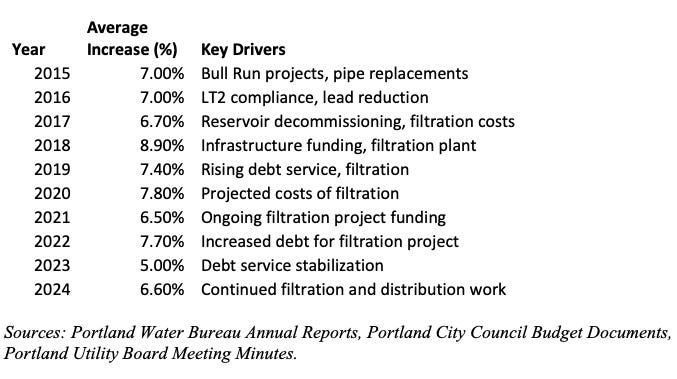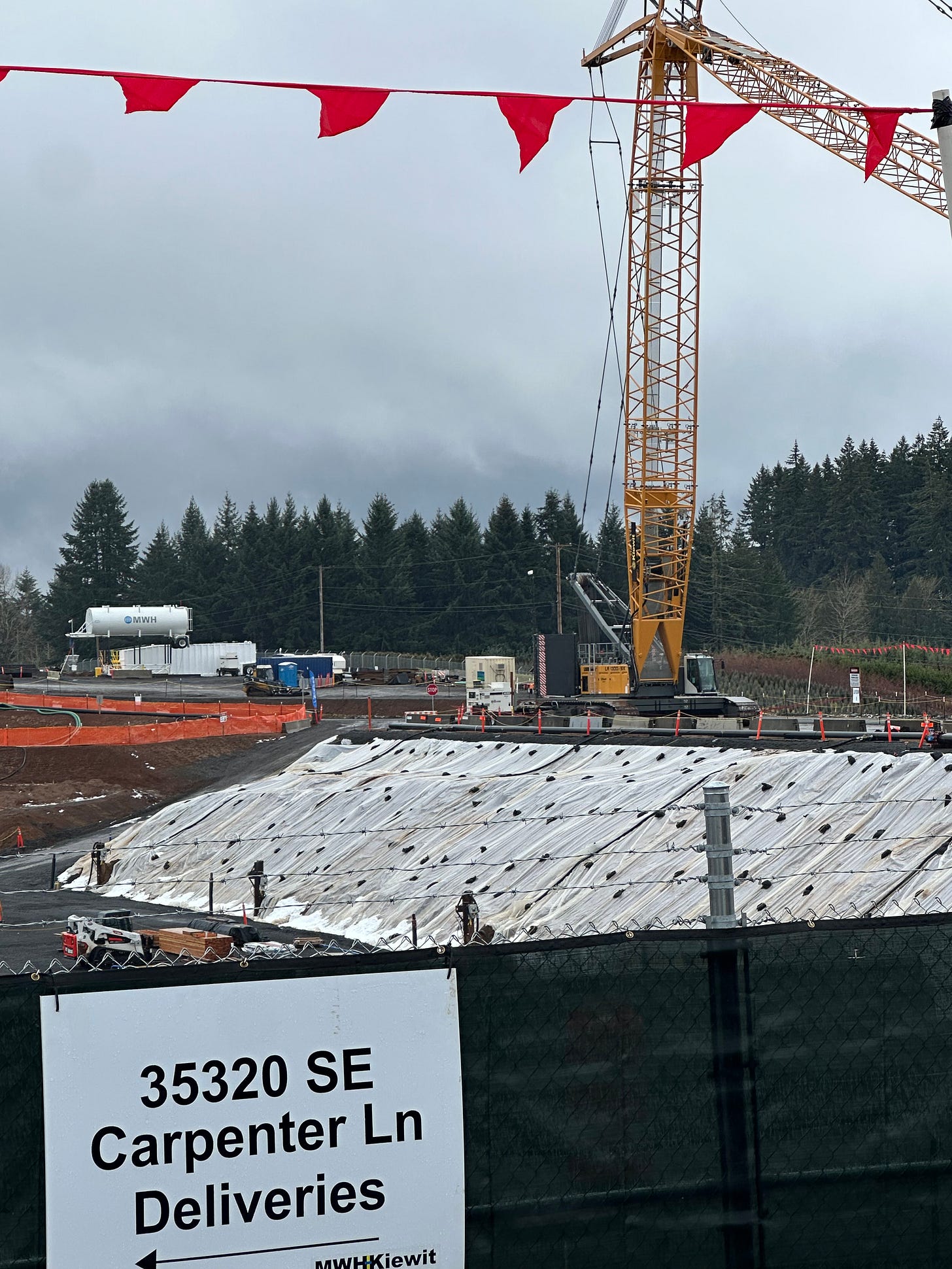The $3.7 Billion Boondoggle: Why Portland Water Bills Are Set to Explode
Paying for Utilities—or Groceries? Portland’s Bull Run Filtration Plant Disaster is Just Getting Started amid a nearly 100M city deficit.
If you are like many people who live in Portland, you probably feel as if the city asks a lot from its residents, especially when it comes to taxes, fees, and utilities. On May 15th, when the Portland Water Bureau announced that, with Portland City Council approval, it will raise its rates 6.34% this summer, there were quite a few people up in arms. We have even had followers reach out to us and tell us that they might have to choose between paying for water or food, or other utilities, such as heating and cooling.
If Portland’s rising cost of living feels like extortion, you’re not imagining it. Behind the scenes, a bloated bureaucracy is flexing its power—imposing massive costs without a vote, without consent, and without accountability. This is what it looks like when government agencies quietly tax the public under the guise of progress - without a single vote from the public.
If the H20 Hustlers get their way, Portland residents’ water bills are scheduled to double from 2024 to 2030, which is a disturbing trend considering with this newest proposed increase, an average household will be paying a whopping $160.29 per month, or nearly $2,000 per year in 2025. One has to wonder why Portland, which has an over-abundance of water resources and 40 inches of annual rain is struggling with such high-water rates, when cities such as Phoenix, Arizona, a place of that experiences regular water shortages, manage to keep its rates at a fraction of Portland’s. Even Seattle, which has similar water resources, doesn’t experience such dramatic increases.
Although a recent Oregonian article called the 6%+ hike the largest since 2011, Portlanders have actually faced steep and steady rate increases for over a decade. Reporter Shane Kavanaugh told me the stat he cited confused a few others too—what he was referring to was the combined increase in water and sewer rates. So if you thought this year’s spike was an outlier, think again. Here's the pattern we've been seeing year after year:
Here is another telling visual. Portland Water Rates vs. Inflation (2014–2024):
Portland Water Rates have increased by approximately 81% since 2014.
U.S. Inflation (CPI) over the same period rose by roughly 34%.
Water rates in Portland have risen at more than double the rate of inflation over the last decade. This steep climb is far beyond what’s explainable by general cost-of-living increases — strongly suggesting internal cost drivers like mismanaged capital projects, long-term debt, and bureaucratic overhead are at play.
No doubt a driving factor in recent years, the preparation for the new Bull Run filtration project that broke ground in June of 2024. Originally priced at around $500 million in 2017, the cost of the water boondoggle has more than quadrupled since then, with its current cost estimated at $2.13 billion. At a meeting out in East Gresham back in March, Charles Waugh who has led a group of locals most directly affected by the water treatment plant, said he attended a meeting with city and county officials who said the price tag was quickly approaching $2.5 billion and beyond.
In order for the city to pay for the site, they are borrowing 49% of the 2.13 BILLION on a 30-year loan WIFIA loan, (Water Infrastructure Finance and Innovation Act). The other 51%, paid by rate payers. Here are some projections:
With the interest and the wholesale PWB clients planning to get water elsewhere (we will get to that shortly) the total project cost will no doubt reach over $3 billion. This loan equates to $5 million dollars of monthly payments, or $60.4 million per year.
Originally, the city claimed that rates would not increase more than the standard yearly rate increases, but back around the time they broke ground, the city had changed its tune, and has claimed rates would increase over 8% per year. But sources say repayment on that loan doesn’t start until 2028, so the projections PWB provided also don’t include that burden.
After nearly a year of PWB rate gaslighting about this project’s impact, last week the Interim Water Bureau director informed (warned) Portlanders in a recent article by Shane Kavanaugh at the Oregonian.
The combined monthly bill for both in a typical city household would increase to $160.29 starting in July, up from about $150.74 the previous fiscal year, budget documents reviewed by The Oregonian/OregonLive.30
That means the average Portland household would pay more than $1,900 annually, an amount that is currently projected to surpass $2,400 by 2030, according to city estimates.
However, the city’s forecasted annual rate increases over the next five years will likely climb even higher when officials adjust them this fall, Quisha Light, interim Water Bureau director, said during a presentation this week to the Portland City Council’s public works committee.
Here is some of my footage from the site, a before and after comparison.
With the expected rate increases, several municipalities which historically use water from Bull Run, are making plans to back out of the arrangement. Wholesale water customers like Gresham, Clackamas County and Tualatin Valley have all announced they are finding other sources for water, which include drilling wells from ground water. Portlanders don’t appear to have an “out” from the excessive water rates. Drilling requires extensive permitting, environmental impact assessments, and compliance with state and federal laws, all of which excludes Portland customers from going this route. In any event, with the unforeseen loss of a considerably large number of wholesale customers, it means that the cost of the project with be projected on fewer customers, which no doubt will increase the cost to individual households.
Speaking of environmental impact, construction on the 94-acre site has already led to the removal of over 300 trees, including mature redwoods, and has created significant environmental concerns. The area of the filtration plant is former farmland. The construction requires digging out massive 30-foot wide craters. So much water was being released from excavating equipment and ground during the excavation that it was estimated 1.2 million gallons per day was washing out of the site and into neighboring properties and creeks. (Let’s not forget the soil is contaminated from pesticides used in decades past.) This constant stream of water is flowing during construction hours flowed into Johnson Creek and eventually the Clackamas River. This much water impacts fish and amphibians not to mention erodes land. Several neighbors raised the alarm of this run off to PWB officials, and although they claimed Portland Water would monitor it, but nothing was done.
Wildlife has also been greatly affected. Locals have reported that salamanders, frogs, migratory birds, and even mammals, such as foxes, and a whole herd of elk, have seemingly disappeared, and experts are uncertain if they will ever return to the area. Another area of concern was the destruction of roads in both Multnomah and Clackamas County in the immediate area from the huge dump trucks running 12 plus hours per day on roads that were not meant to take such heavy vehicles.
In reviewing the construction plans, it’s clear this rural site—some of it seized through eminent domain from multi-generational landowners with homesteads—isn’t just a water facility. It includes a fitness center, large break room and outdoor seating, multiple conference rooms, a cafeteria, and even a lactation room. I want to underscore this is a rural area for a city facing severe shortfalls in budgets.
The Filtration Plant plans are here for review.
At a hearing I attended last year at City Hall, Portland Water Bureau executives and vendors proudly referred to this as a “legacy project” they expect to be celebrated nationwide. They also plan to offer public tours.
Meanwhile, the rural neighbors—whose lives have been upended—are devastated. Their once-quiet corner of the county now sees constant truck traffic hauling chemicals through their community.
In early February of this year, the Portland Water Bureau announced that it had stopped the construction altogether. As it turns out, in January, the Land Use Board of Appeals (LUBA) had issued a ruling stating that Multnomah County had failed to obtain the standard permitting and environmental impact studies prior to beginning construction, which means, the construction wasn’t legal. It appears that PWB knew they hadn’t provided the studies needed, but began the construction anyway, knowing full well that the county and state wouldn’t make them demolish the work they already did.
One contractor on-site, whose company was tasked with maintaining on-site equipment, claims there has been mismanagement as well. In one case, after the project was shut down, a few weeks later several dozens of contract welders showed up from all over the country in order to begin their portion of the project. Apparently, no one had told these contractors that the project was shut down, meaning more money out of the window. Even more shockingly, Willamette Week announced at the end of April that $6.7 million of the money meant for the project vanished in a fraud scheme. Local and federal authorities are investigating the fraud, and the cash was in the hands of the U.S. Marshall’s office after it was discovered in New York state.
Going back to the LUBA decision, the decision has been remanded back to Multnomah County. In response to this, PWB hired a taxpayer paid lobbyist out of North Carolina to get a bill sponsored in the state Senate, SB 936, that would allow the Bull Run Project to be green-lighted through an expedited process that would be able to skirt past any and all land use appeals. It was sponsored by Senator District 25 Chris Gorsek, who after speaking with citizens familiar with the back door maneuvering, dropped his bill sponsorship stating he wasn’t fully aware of the PWB project. This might sound dubious, and it is. As a matter of fact, it smacks of absolute corruption, but what can one expect in the state of Oregon, especially with the Big Water Boondoggle leading the way.
What is even more egregious about the Bull Run Project, is that the filtration plant appears to be unnecessary. Many other municipalities around the United States use UV water filtration systems, and many of these are cities that are considerably larger or at least as large as Portland. These include New York City, Seattle, Boston, and San Francisco. UV systems are much less expensive than Bull Run’s multi-barrier system, and also less intrusive on the environment. The officials at PWB refused to even look at a UV system and used the excuse of ridding Bull Run water of Cryptosporidium, a type of parasite that can be harmful to humans if ingested in large amounts.
According to one PWB vendor at speaks with me in my PDX Real inbox:
Currently, the prognosis of the Filtration Plant means your Portland water will double in cost, and the additional chemicals will be added to your water.
Courtesy of Bull Run Water Guardians
The Portland Water Bureau has publicly claimed that the federal government required them to build the expensive filtration system currently under construction in order to comply with Cryptosporidium standards. They've repeatedly implied that only this approach—not UV disinfection—would meet federal mandates.
But that’s misleading. The EPA's LT2 rule does not prescribe the type of filtration—only that water systems must meet treatment benchmarks if Cryptosporidium is detected. In fact, UV disinfection is an EPA-approved option. PWB had the opportunity to keep testing Bull Run water to determine whether a less costly treatment, like UV, might suffice. Instead, after multiple detections of Cryptosporidium, they abandoned that path and committed to a $2.13 billion project. Critics argue that testing stopped once a preferred—and far more expensive—option was already in motion.
Leading the fight against the PWB has been a small group of locals, mostly farmers, other property owners, and small organizations, such as Bull Run Water Guardians and Cotrell CPO
They have raised money through pot lucks, nursery sales, and fund raising, just enough to hire their own attorney to fight the PWB’s and the city’s attorneys. They have been remarkably successful and resourceful, as the LUBA decision came directly from their complaints and testimony at public meetings. They were also successful in shutting down SB 936, which is now officially dead in the water as legislation.
Currently, the 4 to 6 month filtration plant hault following the Remand from LUBA will cost the cities taxpayers additional money. According to Charles Waugh, the Bull Run Project is still not a done deal, meaning that there is still a chance for the project to change course.
Mayor Wilson and Portland City Council insist they are easing Portland’s cost-of-living squeeze, yet they appear to be on-board with the Bull Run Project as it stands, even though the plan forecasts nearly double-digit rate increases. While families are already deciding between the water bill and the grocery bill, they are the one’s Wilson and his clan want to bankroll City Hall’s Water Lamborghini.
Obviously, our drinking water must be safe to drink, and so they must keep parasites such as Cryptosporidium at acceptable levels. UV treatment would not only perform this task, but would cost as much as ¼ of the cost of the current plan. Even the Oregon Health Authority in it’s Bilateral Compliance Agreement with PWB leaves the treatment method up to the decision of the city.
Interesting to note I have two copies of this bilateral agreement. One updated revision on the PWB website and one from those fighting the boondoggle.
As Portland becomes more broke, why is the city still chasing legacy projects that are more based in ideological thinking than common sense and science? Our leadership seems to be betraying the constituents by choosing the costliest and most environmentally affecting option.
Council still has an off-ramp: reopen the books, price out UV in an open hearing, and explain, clearly, why ratepayers must fund the deluxe model. Portlanders should flood City Hall with letters until we get them into the discussion. When a less-costly, EPA-approved alternative exists, refusing to consider it is fiscal malpractice.
This Wednesday, Portland City Council will vote on yet another rate increase. (This is a second reading and thus there will be no testimony.) I encourage you to reach out to the mayor’s office and the councilors in your district to ask them why we are paying such high rates.
Also worth remembering: City Hall removed public access to council members' email addresses and phone numbers. (I wrote about that here.)














This from Amanda Fritz in 2009:
“The Portland Water Bureau was making the case [in favor of] a $700 million water filtration system for Bull Run water to protect against Cryptosporidium.
“Commissioner Saltzman and Fish supported my asking for a work session regarding the relative merits of filtration versus ultraviolet treatment. I requested a public hearing, to make a better-informed decision that included citizens’ input, in addition to the Bureau’s advice.
“After the hearing, we came to a consensus in favor of ultraviolet treatment – costing $180 million. That’s saving a half-billion dollars; or $342,000 per day, of the four years that I will be in office – done by my looking at details, discovering and laying out the facts, and asking my colleagues to have a discussion and public hearing.”
Her email address was at the bottom of the article. What has happened?
https://eastpdxnews.com/general-news-features/meet-your-portland-city-commissioner-amanda-fritz/
Great recap. I do wonder why they need the water facility to have all those "personal" amenities through? One thing I can say...Portland sure knows how to spend money...🤑💸